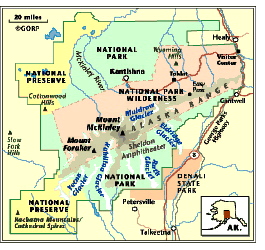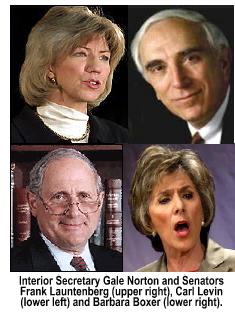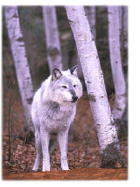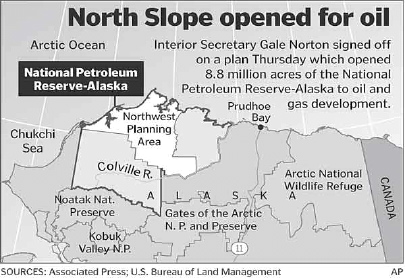
News
Behind the Headlines
Two-Cents Worth
Video of the Week
News Blurbs
Articles
Testimony
Bible Questions
Internet
Articles (2012)
Internet Articles (2011)
Internet Articles (2010)
Internet Articles
(2009)
Internet Articles (2008)
Internet Articles (2007)
Internet Articles (2006)
Internet Articles (2005)
Internet Articles (2004)
Internet Articles (2003)
Internet Articles (2002)
Internet Articles (2001)

Liberals
fighting Bush plan to drill in ANWR.
Also trying to expand perimeters of the Denali
National Park in southern Alaska
Liberals are determined to
keep President George W. Bush from granting new oil leases to independent
oil drillers anywhere in the State of Alaska as the price of gasoline
at the pumps spiked ten cents a gallon last Monday.  As
the Bush Administration pushed the GOP majority to approve
Administration plans to open a small section of the Arctic National
Wildlife Reserve for new oil exploration in January of this year,
three liberal Senators, at the urging of environmentalist animal rights
groups plan to introduce legislation to expand the buffer zone around
the Denali National Park (that currently consumes about 20% of
the State, reaching from the outskirts of Anchorage on the southern coast
to Fairbanks halfway up the State). The reason for the need to increase
the "no trespassing" area around the park? To protect the Toklat
wolves. Two female wolves who wandered out of the park in search of caribou
were killed in February. According to Thomas Meier, a wildlife
biologist for the National Park Service at Denali, the Denali wolves
are not as wary of humans as North American wolves are. "Trappers
usually catch young, stupid wolves," Meier noted. "But
that isn't the case here. They are catching mature animals habituated
to people."
As
the Bush Administration pushed the GOP majority to approve
Administration plans to open a small section of the Arctic National
Wildlife Reserve for new oil exploration in January of this year,
three liberal Senators, at the urging of environmentalist animal rights
groups plan to introduce legislation to expand the buffer zone around
the Denali National Park (that currently consumes about 20% of
the State, reaching from the outskirts of Anchorage on the southern coast
to Fairbanks halfway up the State). The reason for the need to increase
the "no trespassing" area around the park? To protect the Toklat
wolves. Two female wolves who wandered out of the park in search of caribou
were killed in February. According to Thomas Meier, a wildlife
biologist for the National Park Service at Denali, the Denali wolves
are not as wary of humans as North American wolves are. "Trappers
usually catch young, stupid wolves," Meier noted. "But
that isn't the case here. They are catching mature animals habituated
to people."
For nearly 40 years, since
1966, another wildlife biologist, Gordon Haber, has been the virtual
godfather of the Toklat wolf pack in the Denali National Park.
Haber, whose job is funded by an animal rights group, has studied
the migratory habits of the Toklat wolves from the air (throughout the
winter) and on the ground (during the summer months). The Denali wolf
pack has often been described as the most-photographed, longest- studied
wolves in the world. It is the animal rights environmentalists who employ
Haber who are using their political connections to cordon off a
new chunk of the State of Alaska as a buffer zone.  State
officials are angry at the latest attempted land grab by three members
of the US Senate—none of whom are from Alaska
State
officials are angry at the latest attempted land grab by three members
of the US Senate—none of whom are from Alaska
Senators Barbara Boxer [D-CA], Frank Lautenberg [D-NJ], and Carl Levin [D-MI] filed a request with Interior Secretary Gale Norton last Monday as the price of gasoline was spiraling out of control, alerting her to what they termed was a "biological emergency" that necessitated immediate steps be taken to "save" the Toklat wolf pack. Alaska state officials are upset about the letter and the threatened legislation that promises to steal an even larger piece of the State by federal bureaucrats if proposed legislation by these liberals gets written—and gets out of committee (which is not likely with oil prices skyrocketing at this time). Matt Robus, the Director of Wildlife Conservation for the Alaska Department of Fish and Game argues that there is no need to do anything since the wolf pack is as robust as it has ever been. There is still a lot of hard feelings in the State towards Washington since in 1980, in the closing days of the Carter years, the bureaucrats seized 104 million acres of Alaska for federal parks and wildlife refuges—specifically to keep the land from being developed by lumber companies, oil exploration and mining companies.
 The
State plans to resist efforts by Haber and the federal bureaucracy
to increase the size of the buffer zone around the Denali National Park
for the protection of wolves since the Toklat population is thriving—with
between 7 to 10 thousand grey wolves in the Denali pack. If anything,
the wolf pack may be too dense since they now find it necessary to travel
much farther to hunt. As a result, more and more wolf families are straying
out of their protected areas and are poaching either on private land outside
the Park, or on a narrow stretch of State-owned land that juts into the
northeast corner of the the Denali Park.
The
State plans to resist efforts by Haber and the federal bureaucracy
to increase the size of the buffer zone around the Denali National Park
for the protection of wolves since the Toklat population is thriving—with
between 7 to 10 thousand grey wolves in the Denali pack. If anything,
the wolf pack may be too dense since they now find it necessary to travel
much farther to hunt. As a result, more and more wolf families are straying
out of their protected areas and are poaching either on private land outside
the Park, or on a narrow stretch of State-owned land that juts into the
northeast corner of the the Denali Park.
The current efforts by the liberals in the Senate who are indebted to the anti-oil environmentalists (who strangely enough are funded by Standard Oil and the Seven Sisters—who have managed to stymie all new oil exploration and development of oil in the United States in order to drive up the price) is designed to remove even more oil rich land in Alaska from the hands of independent oil companies, and keep it safe for the Seven Sisters until the easy-to-reach oil in the Mideast is depleted, oil is selling for $75 to $100 per barrel, and it is then profitable to drill in the wildlands of the Far North, and under the oceans where the world's largest reserves of oil now exist.
.jpg) The
argument of the environmentalist, of course, is that the value of the
Toklat wolves add substantially to the State's economy by bring scores
of tourists to Alaska. In reality, few "tourists" that decide
to spend their summer vacation in Alaska have ever heard of the Toklat
wolf pack before they arrive at the Denali Park. What they come
for is to see Mt. McKinley and the wildlands of America's last frontier.
But according to Haber, who has spent his entire adult life with
the Denali wolves, State wildlife managers are simply playing politics
when they argue that the Toklat population is not endangered since, he
said, you must think of wolves by their individual families,
The
argument of the environmentalist, of course, is that the value of the
Toklat wolves add substantially to the State's economy by bring scores
of tourists to Alaska. In reality, few "tourists" that decide
to spend their summer vacation in Alaska have ever heard of the Toklat
wolf pack before they arrive at the Denali Park. What they come
for is to see Mt. McKinley and the wildlands of America's last frontier.
But according to Haber, who has spent his entire adult life with
the Denali wolves, State wildlife managers are simply playing politics
when they argue that the Toklat population is not endangered since, he
said, you must think of wolves by their individual families,  not
the entire group. Thus, when small families break off from the pack and
leave the safety net of the Park, they are systematically killed by trappers
and ranchers. Refuting Haber's logic, Park board chairman Michael
Fleagle argued that "...[w]e don't manage wolves for their
safety and livelihood and whatnot. We feel that wolves shouldn't be treated
individually. Sure, wolves have a pretty interesting social structure,
but the bottom line is Alaska is crawling with wolves. We manage for population."
not
the entire group. Thus, when small families break off from the pack and
leave the safety net of the Park, they are systematically killed by trappers
and ranchers. Refuting Haber's logic, Park board chairman Michael
Fleagle argued that "...[w]e don't manage wolves for their
safety and livelihood and whatnot. We feel that wolves shouldn't be treated
individually. Sure, wolves have a pretty interesting social structure,
but the bottom line is Alaska is crawling with wolves. We manage for population."
Alaskan officials are worried about Haber since the advocacy of the wildlife biologist was largely responsible for the creation of the buffer zone around the Denali National Park during the 1980 federal land grab. Alaskans resent Haber and Alaskans resent the overreaching of the federal government that is impacting the economy of Alaska by placing its natural resources "off limits"—until Standard Oil needs it. "Resentment," Robus concluded, "is the right word. There is a definite desire to make sure Alaskans have access to state land. And [they] can manage the land not covered by the big federal footprint."
But most Americans aren't worried as much about the big federal footprint in Alaska as they are about the big oily thumbprint of Standard Oil and the Seven Sisters who successfully curbed oil exploration, drilling and development in the Arctic National Wildlife Refuge—ANWR—for over four decades. And they are worried about the environmental lobbyists and PR spinmeisters who successfully sold the American people an ecoalarmist bill of goods as they lobbied Congress into enacting such stringent clean air laws that 80% of all of the oil refineries in America (those owned by independent oil companies not connected with the Seven Sisters) were forced to shut down. Now, as they did when Congress enacted the Sherman Antitrust Act of 1896 specifically to break up John D. Rockefeller's death-grip on the oil industry (who controlled 85% of all oil drilling, refining, and sales in the United States at the turn of the century) Standard Oil and its "independent" subsidiaries: Exxon-Mobil, Sohio, Chevron-Texaco, Atlantic Richfield, and BP-Amoco (that is making the news today for its sloppy safety procedures not only in the United States but in Europe as well). Other Standard Oil wholly -owned entities are Conoco and Sunaco. (These companies were part of the original breakup of Standard Oil ordered in 1911 from a lawsuit filed by the federal government on November 18, 1906. Thanks to pressure applied on US District Court Judge Mountain Landis (a newly appointed 41-year old federal magistrate in 1906) by Senator Nelson Aldrich [R-RI] (the father-in-law of John D. Rockefeller, Jr.) and and a few other Standard Oil loyalists in Congress, Landis originally intended only to hand Standard Oil the largest fine ever assessed in the history of the United States for monopolistic practices. Instead, after a five year trial, Landis broke up Standard Oil—but allowed Rockefeller to keep the ten independent companies he created in the breakup. As its own companies were morphing back together to form larger transnational oil companies that could compete in the new global marketplace, Standard Oil subsidiaries began assuming other companies through stock buyouts or, in some cases, buying enough stock in those companies to place its officers on the boards of those companies. Oil companies partially owned by the Seven Sisters are: Pennzoil, Ashland Oil, Sinclair, Phillips 66, Citgo, Gulf, and Marathon. The Standard Oil family—which comprises most of the places you buy gasoline for your car—owns from 25% to 60% of all of the oil wells in the Mideast. Standard Oil has partnered with Lukid, the largest oil producer in Russia and, most recently, the Seven Sisters joined with the People's Republic of China to farm the world's largest oil reserves under the China Sea.
So, when you go to the gas station this week and grumble as you pump $2.30 to $2.50 per gallon gasoline into your car, remember this: it isn't the abundance, or lack of, oil that is making the price of gasoline spike. It is the lack of oil refineries in the United States. However, when Congress begins talking about federalizing oil rich lands to keep those lands out of the hands of wildcat oil speculators, it is enough to spook the oil futures market. And, the futures market does immediately impact the price of oil at the pumps. So if you aren't doing anything special this weekend, why not dash off an email to Senators Boxer, Levin and Lautenberg and let them know how much you appreciate their efforts on behalf of the Denali wolves. Or better yet, send them a telegram or make a personal telephone call. I'm sure the Senators would like to know what you think of them for protecting the wildlife of Alaska as you spend up to 50 cents a gallon more for gasoline.
Once again, you have my two cents worth...



Copyright © 2009 Jon Christian Ryter.
All rights reserved.



